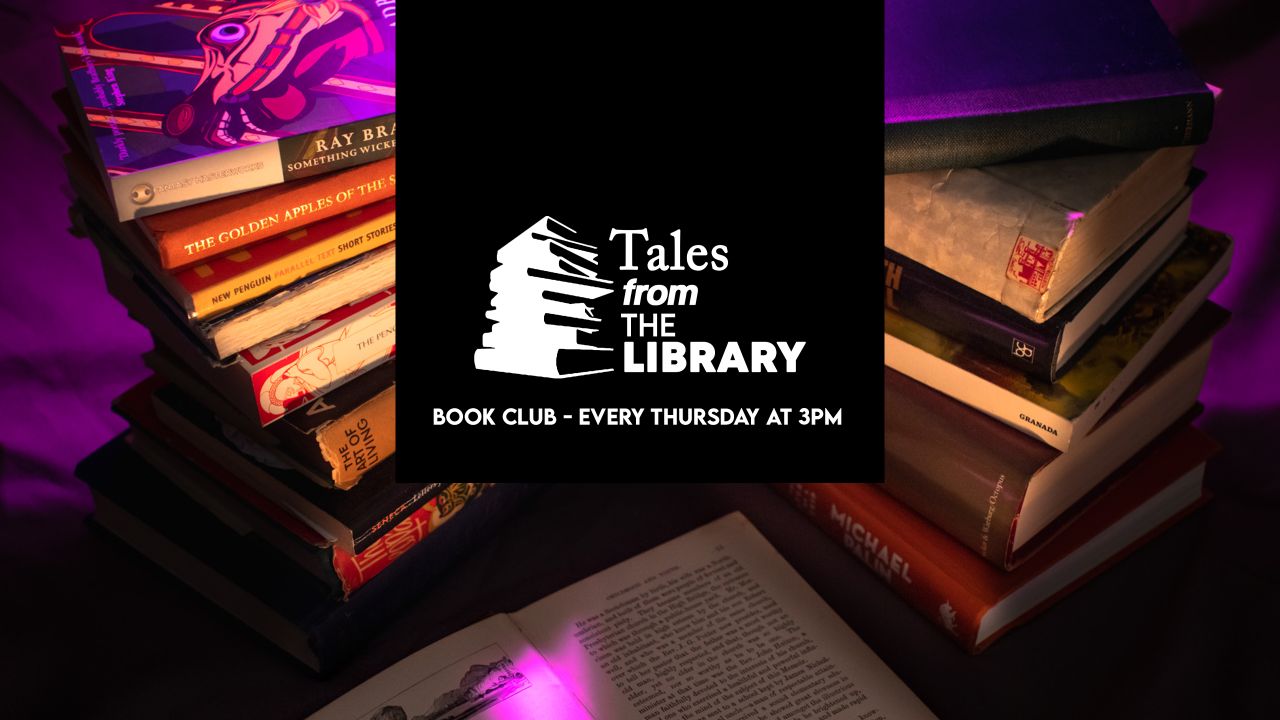Tales From The Library - The Fog Horn
Checking for any available downloads...
Download this video to your computer: Download
(right-click and choose "Save/Download Linked File As...." or similar)
Above link not working? Click here to launch Zoom session
Join us on Thursday at 3PM to chat about the book!
The Fog Horn
by Ray Bradbury
Read the Book as a PDF: The Fog Horn
Listen to the Book: The Fog Horn
This week in the Book Club we will be reading 'The Fog Horn' by Ray Bradbury. 'The Fog Horn' is a 1951 science fiction short story by American writer Ray Bradbury, the first in his collection The Golden Apples of the Sun. The story was the basis for the 1953 film The Beast from 20,000 Fathoms.
The story tells of two men isolated on a lone island as lighthouse keepers. On the night before one of the men returns to land the older man reveals he has a secret to tell; tonight is the night that a strange and mysterious creature from the depth of the sea visits the lighthouse, lured out of the deeps by the call of the lonely fog horn...
'A big lonely animal crying in the night. Sitting here on the edge of ten million years calling out to the deeps. I'm here, I'm here, I'm here.'
The story speaks of mystery and the unknown, the limits of our human understanding and of loneliness and isolation - not only of the solitary monster traveling all year to hear the familiar sound of the fog horn calling to it, but the two men on the island, cut off from the mainland and others. The shared human fear of being stranded and alone in the world resonates deeply with us all, to be cut off and apart from the world and others is in some cultures viewed strongly as another form of death.
'That's life for you," said McDunn. "Someone always waiting for someone who never comes home. Always someone loving some thing more than that thing loves them. And after a while you want to destroy whatever that thing is, so it can hurt you no more.'
In our modern world we are in constant communication with the people around us, and it is very difficult when we are in extended isolation. Not only do we communicate with other people in our proximity, the lady at the cash till as you buy your grocery’s, but also with friends and family all over the world and in different time zones. In today's digital age, where one can communicate with someone else through e-mail, Facebook, or Skype how is it possible that we can still occasionally feel so isolated and alone? How does this resonate with the Christian belief that we are never truly alone as with our faith we can always be in the presence of God.
The fact that the monster finds comfort and companionship in the noise of a fog horn also raises the question of; Who or what provides us with companionship?
'One day many years ago a man walked along and stood in the sound of the ocean on a cold sunless shore and said "We need a voice to call across the water, to warn ships; I'll make one. I'll make a voice that is like an empty bed beside you all night long, and like an empty house when you open the door, and like the trees in autumn with no leaves. A sound like the birds flying south, crying, and a sound like November wind and the sea on the hard, cold shore. I'll make a sound that's so alone that no one can miss it, that whoever hears it will weep in their souls, and to all who hear it in the distant towns. I'll make me a sound and an apparatus and they'll call it a Fog Horn and whoever hears it will know the sadness of eternity and the briefness of life.'
The original title of the story was 'The Beast from 20,000 Fathoms'. It was published in The Saturday Evening Post. Meanwhile, a film with a similar theme of prehistoric sea monster was being shot under the working title of Monster from Beneath the Sea. Later the producers, who wished to capitalize on Bradbury's reputation and popularity, bought the rights to Bradbury's story and changed their film's title. Bradbury then changed the title of his story to 'The Fog Horn'.
(It should be noted that the audiobook version of this story albeit very good, does miss out the odd word and leaves out a short paragraph at the end of the story, so i would encourage you to read the text as well as listen to the story)
About the Author
 Ray Douglas Bradbury, American novelist, short story writer, essayist, playwright, screenwriter and poet, was born August 22, 1920 in Waukegan, Illinois. He graduated from a Los Angeles high school in 1938. Although his formal education ended there, he became a "student of life," selling newspapers on L.A. street corners from 1938 to 1942, spending his nights in the public library and his days at the typewriter. He became a full-time writer in 1943, and contributed numerous short stories to periodicals before publishing a collection of them, Dark Carnival, in 1947.
Ray Douglas Bradbury, American novelist, short story writer, essayist, playwright, screenwriter and poet, was born August 22, 1920 in Waukegan, Illinois. He graduated from a Los Angeles high school in 1938. Although his formal education ended there, he became a "student of life," selling newspapers on L.A. street corners from 1938 to 1942, spending his nights in the public library and his days at the typewriter. He became a full-time writer in 1943, and contributed numerous short stories to periodicals before publishing a collection of them, Dark Carnival, in 1947.
His reputation as a writer of courage and vision was established with the publication of The Martian Chronicles in 1950, which describes the first attempts of Earth people to conquer and colonize Mars, and the unintended consequences. Next came The Illustrated Man and then, in 1953, Fahrenheit 451, which many consider to be Bradbury's masterpiece, a scathing indictment of censorship set in a future world where the written word is forbidden. In an attempt to salvage their history and culture, a group of rebels memorize entire works of literature and philosophy as their books are burned by the totalitarian state. Other works include The October Country, Dandelion Wine, A Medicine for Melancholy, Something Wicked This Way Comes, I Sing the Body Electric!, Quicker Than the Eye, and Driving Blind. In all, Bradbury has published more than thirty books, close to 600 short stories, and numerous poems, essays, and plays. His short stories have appeared in more than 1,000 school curriculum "recommended reading" anthologies.
How to join the club to chat
The zoom link to join will apear above on this page at 3PM on Thursday. To join you will need a phone/tablet or laptop with a built in camera and microphone (most modern devices come with this) you may need to download the zoom app onto your phone if you are using a phone to join.
Sign up if you would like to receive an email reminder of the book club, to do this you must first create a profile.




 Add to Favourites
Add to Favourites




Login to comment.